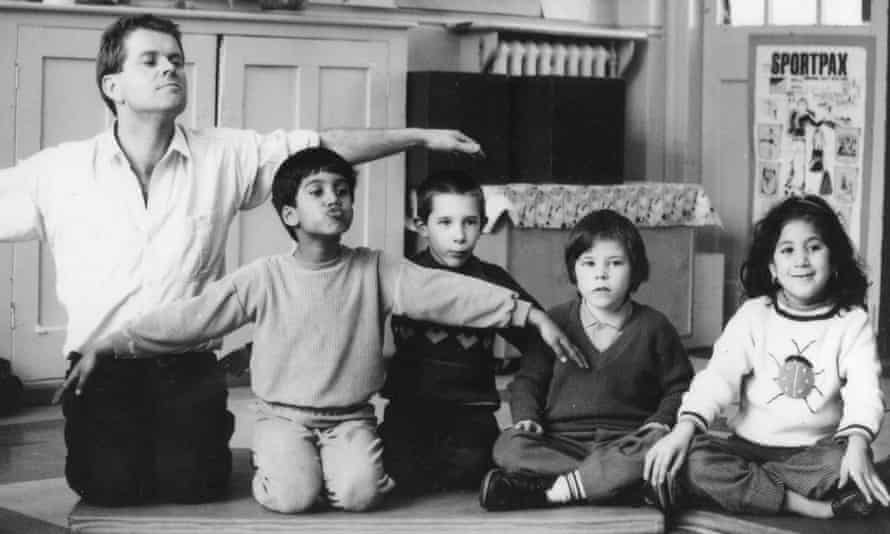
David Johnston, the pioneer of theatre for young people, who has died aged 69 after suffering a stroke, championed both children and artists. He believed strongly that young audiences deserved the best work by actors, writers and directors of the highest calibre. Eschewing what he dismissed as plays about “kings, queens and wizards”, he created theatre that reflected the complexities and challenges of the world in which children grew up.
In the late 1970s and 80s, as director of Theatre Centre, a company based in north London and dedicated to young people, he set about staging work about the lives of working-class children, environmental catastrophe, sexuality, fascism and other cultures.
The anthropologist Hugh Brody, who worked with Johnston in 1981 on a play called Imap Inua which explored and celebrated Inuit culture and storytelling, was struck by his commitment to theatre that was both accessible and magical, but which also told the truth. “He was always in pursuit of the truth – many different kinds of truth. He had me work with actors on the exact pronunciation of Inuit language that he insisted be part of the script; and even on the way Inuit walk and sit.”
Johnston’s politics were in opposition to Margaret Thatcher’s Conservative government of the 80s (he staged a version of The Pied Piper featuring a mayor with a close resemblance to Thatcher) and his determination to tell uncomfortable truths sometimes made him the subject of sensationalist headlines.

When, in 1981-82, to coincide with the Festival of Peace, Theatre Centre staged David Holman’s trilogy – Peacemaker, Susumu’s Story (about the legacy of Hiroshima) and 1983 (about cruise missiles) – the employment minister Norman Tebbit tried and failed to get the plays banned. Supported by local authorities and the Arts Council, the tour went ahead despite the headlines.
Johnston was born in Saltburn-by-the-Sea, north Yorkshire, to Alan Johnston, an Anglican vicar, and his wife, Joan (nee Hindmarch), who would later become a teacher when the family moved to Rotherham. Johnston studied politics at Sheffield University, graduating in 1970. He spent a year in industry before gaining a teaching qualification in drama at Bretton Hall College, near Wakefield.
In 1972, he co-founded the theatre-in-education company New Perspectives, and in 1975 he was a driving force behind the establishment of the Standing Conference of Young People’s theatre (SCYPT), before taking over from its founder, Brian Way, as artistic director of Theatre Centre in 1977. Over the next 10 years, at Theatre Centre and beyond, he encouraged the careers of actors including Juliet Stevenson, Diane Louise Jordan and Adjoa Andoh, and promoted writers including Bryony Lavery, Holman, Lin Coghlan and Noël Greig.
Long before diversity became a buzzword in theatre, Johnston was putting in place policies that developed integrated casting and creating companies of actors that welcomed performers and writers of diverse genders, race and sexuality. During his time at Theatre Centre, he collaborated with the disabled company Graeae, and an all-women company was formed. When Andoh was offered a job with Theatre Centre in 1985 in the same week that she discovered she was pregnant, Johnston’s unfazed response was simply that the company would need to institute a maternity policy. For Johnston, diversity and creativity always walked hand in hand.
Jenny Sealey, Graeae’s current artistic director, who co-directed the opening ceremony of the 2012 Paralympic Games, says it was Johnston who “made me who I am today”. While running Roundabout, the resident theatre-in-education team at Nottingham Playhouse in the 90s, he gave Sealey her first directing opportunity and, as he did with many others, he became her “ad hoc mentor for evermore”.
Being a pioneer can be exhausting, and after a decade at Theatre Centre Johnston left to go freelance, during that time founding the children’s theatre festival Take Off in 1987 (which continues to this day), working in Adelaide in Australia on the Come Out festival (now the DreamBig festival), and eventually heading up Roundabout between 1991 and 1998, as well as leading on a range of artistic and educational projects across the county. Ruth Mackenzie, who was chief executive at Nottingham Playhouse at the time, recalls Johnston affectionately as someone who created work of “international quality and innovation which changed the lives of many people it touched”.
He always had an international outlook, was tireless in his promotion of the best UK theatre for young people, and, as international rep for the International Association of Theatre for Children and Young People (ASSITEJ), opened the eyes of British members to work being produced in other countries.
In 2003, together with his long-time collaborator Ava Hunt, he set up Tangere Arts, a company based in the East Midlands that toured in the UK and abroad with richly textured children’s shows including Greig’s The Tin Soldier (2010), and A Thousand Slimy Things (2012). He was working on new projects at the time of his death.
He is survived by Michael, his son with Hunt, and by his sisters, Clare and Theresa, and his mother.
• David Nicholas Johnston, theatre director and consultant, born 15 November 1948; died 23 November 2017
https://www.theguardian.com/stage/2017/dec/18/david-johnston-obituary
Johnson71
Nessun commento:
Posta un commento